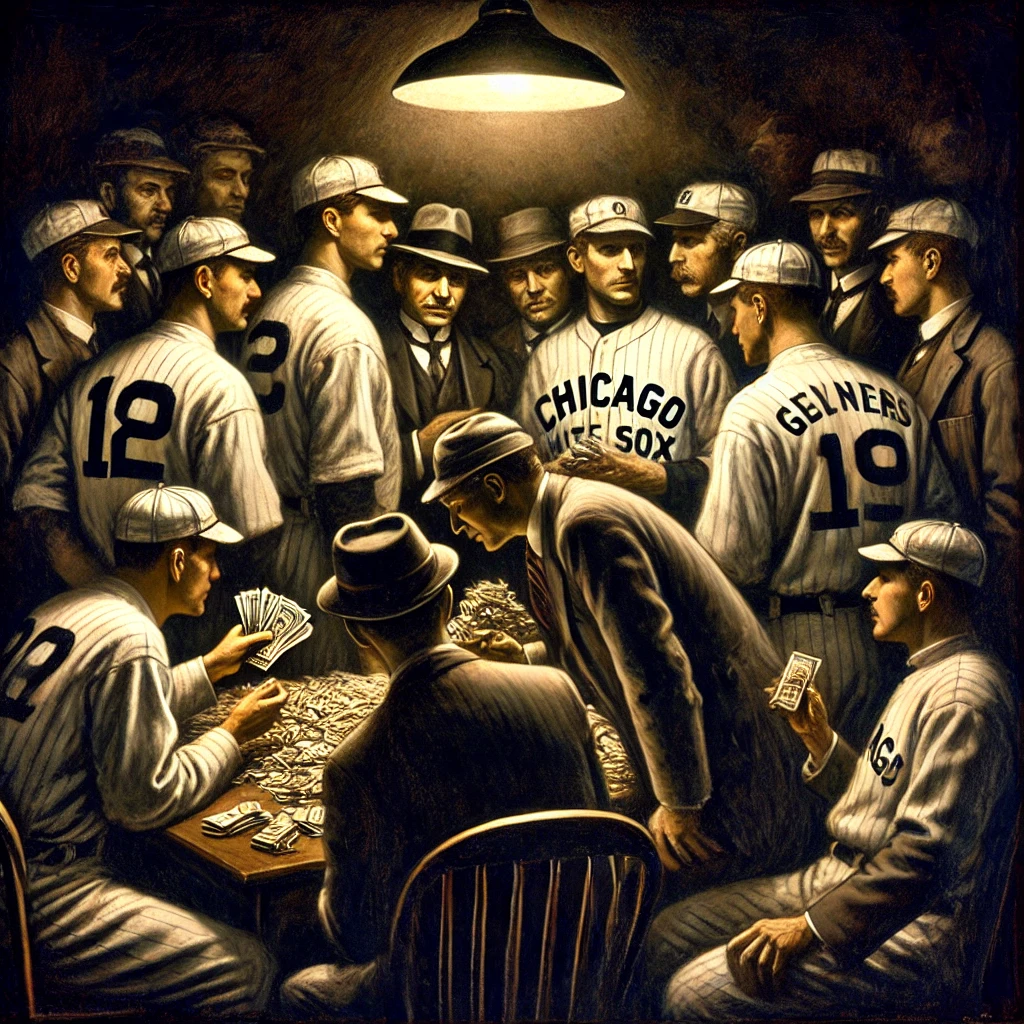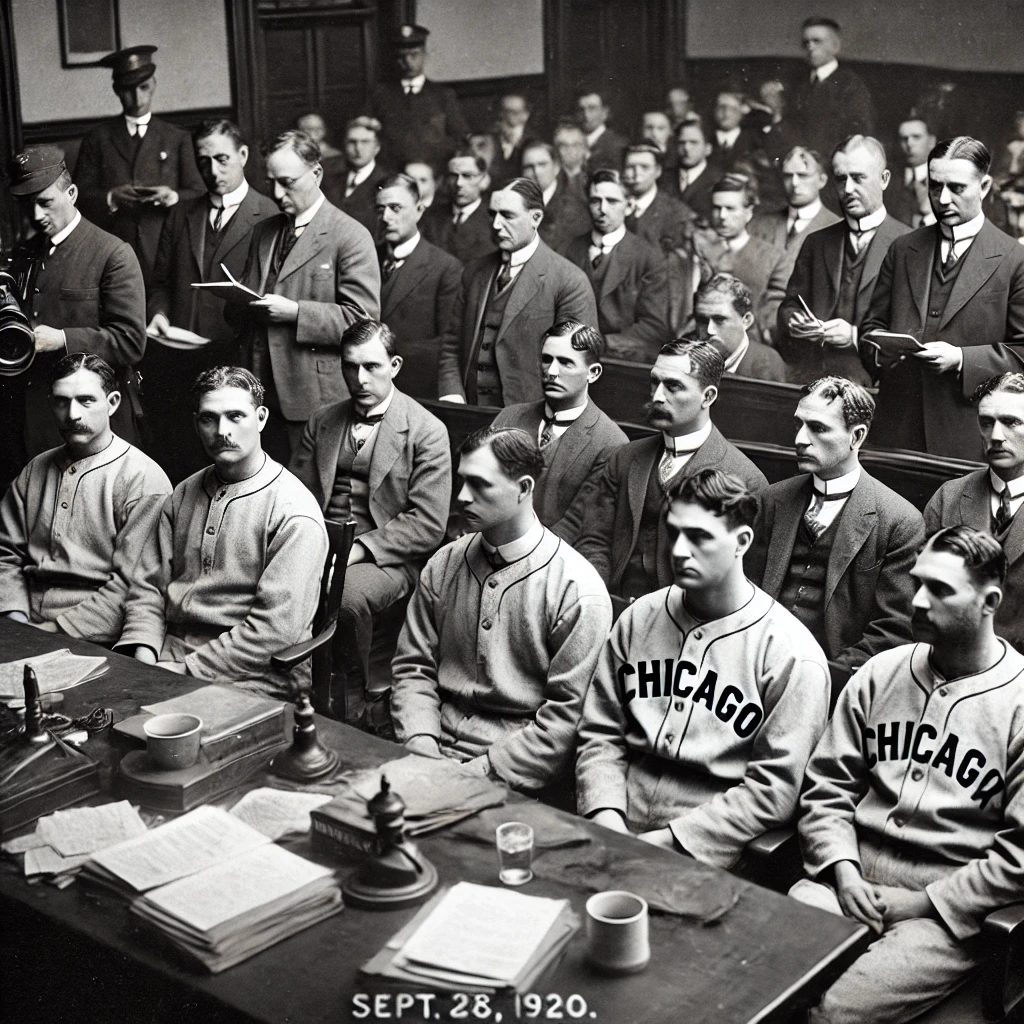On September 28, 1920, the Black Sox Scandal erupted into public view as a grand jury indicted eight members of the Chicago White Sox baseball team. This shocking revelation claimed that the players had conspired to deliberately lose the 1919 World Series to the Cincinnati Reds in exchange for a bribe. The scandal not only tarnished the reputation of America’s pastime but also raised critical questions about integrity in professional sports, leading to significant reforms in baseball governance.

The 1919 World Series: A Setup for Betrayal
The 1919 World Series pitted the Chicago White Sox against the Cincinnati Reds, with the Sox heavily favored to win. Despite their talent, the team lost the series in a stunning upset, raising suspicions among fans and sportswriters. It later emerged that several players had colluded with gamblers to fix the outcome of the series, seeking financial gain at the expense of their integrity and the trust of their fans.
The motivations behind the scandal were rooted in a combination of player dissatisfaction and financial hardship. Many players on the White Sox, despite being a talented team, felt underpaid compared to their contributions. This discontent made them susceptible to the allure of easy money offered by gamblers looking to influence the series outcome. The actions of these players not only undermined the principles of fair competition but also betrayed the loyalty of their fans.

The Indictment and Public Outcry
The indictment of the eight players—known as the “Black Sox”—was met with a mix of disbelief and outrage. Among the accused were star players like “Shoeless” Joe Jackson and Eddie Cicotte. As news of the scandal broke, it sent shockwaves through the nation, prompting a public outcry for accountability. Fans who had devoted their time and money to support the team felt cheated, and the scandal cast a long shadow over the integrity of the sport.
The fallout from the scandal extended beyond the players to include team management and baseball executives. The damage to the White Sox’s reputation was profound, and the scandal prompted questions about the effectiveness of baseball’s governance. In the wake of the indictment, the sport faced intense scrutiny, leading to calls for reforms to restore public confidence.
Major League Baseball’s Response
In response to the scandal, Major League Baseball appointed former New York Governor Kenesaw Mountain Landis as the first Commissioner of Baseball. Landis took swift action to restore integrity to the game, imposing lifetime bans on all eight players involved in the scandal, regardless of their individual levels of culpability. This decisive move signaled a new era in baseball governance, prioritizing the preservation of the sport’s integrity over individual players’ careers.

Landis’s actions laid the groundwork for the future of baseball, establishing a precedent for how the league would handle issues of corruption and misconduct. The establishment of a commissioner with the authority to enforce rules and discipline players marked a significant shift in how the sport was governed, aiming to prevent future scandals and ensure the integrity of the game.
Lasting Impact on Baseball and Sports Culture
The Black Sox Scandal had far-reaching implications for baseball and sports culture in general. The scandal revealed vulnerabilities in the integrity of professional sports and highlighted the potential for corruption within competitive arenas. It forced leagues to reevaluate their regulations and oversight mechanisms to safeguard against similar incidents in the future.
The legacy of the Black Sox Scandal continues to resonate in contemporary sports discussions. It serves as a cautionary tale about the importance of ethics and integrity in athletics. The phrase “throwing a game” remains synonymous with corruption, and the scandal is often referenced in discussions about the pressures athletes face from external influences, including financial temptations and gambling.
Cultural Reflections and Media Influence
The Black Sox Scandal has been the subject of numerous books, films, and documentaries, illustrating its enduring impact on American culture. These retellings explore the complexities of the scandal, delving into the motivations behind the players’ actions and the broader societal context in which the events unfolded. The scandal not only influenced public perceptions of baseball but also contributed to a growing awareness of the relationship between sports, ethics, and media.
The indictment of the Chicago White Sox players on September 28, 1920, marked the beginning of a tumultuous chapter in baseball history known as the Black Sox Scandal. The events surrounding the scandal exposed deep-rooted issues of corruption and integrity within professional sports, leading to significant reforms in baseball governance. As we reflect on the legacy of the Black Sox Scandal, we recognize its lasting impact on the sport and the ongoing importance of ethics and integrity in athletics. The scandal serves as a reminder of the vigilance required to uphold the principles of fair competition and the responsibilities athletes carry in representing their sport.
